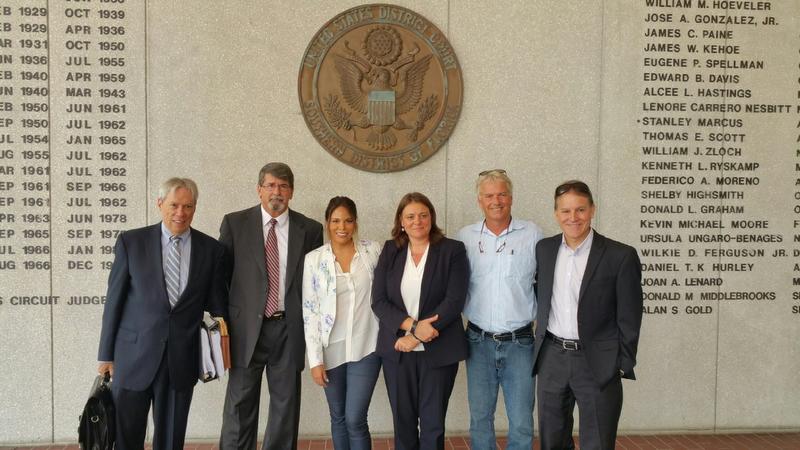By Laura Reynolds, Consultant for Southern Alliance for Clean Energy and ORCA The team for the plaintiffs shown above in front of the Clyde Atkins Courthouse on August 3, 2017, from left to right: Gary Davis, Jim Porter, Claudia Tenzer, Laura Reynolds, Steve Smith and George Cavros On August 3, 2017 Southern Alliance for Clean Energy, Tropical Audubon Society and The Friends of the Everglades achieved another success – we had the first hearing on our Clean Water Act case with Magistrate Judge Alicia M Otazo-Reyes and she listened to the merits of the arguments from both sides on FPL’s motion to dismiss. FPL’s basic argument was that the 2016 DEP Consent Order and the 2015 DERM Consent Agreement address the allegations of surface-water pollution raised in our case, and that they were sufficient to address the plaintiffs’ concerns. Therefore, FPL believes our claims of injury are nullified and that we have no standing to proceed with the case. We wholly disagreed and in our response we clarified that while the limited DEP and DERM enforcement documents address some elements of past ground-water pollution, they fail to address the full scope of our concerns and allegations on several fronts. First, they fail to address the Biscayne Bay Surface Water violations, failing even to mention these violations in defiance of the Clean Water. Second, they only address historical pollution and categorically fail to address the ongoing violations of both their permits and the Clean Water Act, which will continue for many years to come barring comprehensive corrective action. We filed an expert declaration from Kirk Martin, a hydro-geologist and president of ‘Water Science Associates,’ showing the limitations with the enforcement efforts by the State and County thus far and were given another opportunity to file a supplemental expert declaration to further prove our case. The science shows that every time the water is higher in the cooling canals and lower in Biscayne Bay the pollutants in the industrial waste facility will continue to leak out into the surrounding environment beyond the G-III boundary and into the waters of the U.S. and our aquifer. Thus, the collector wells and limited refurbishments proposed by regulators will not actually stop these impacts and they will continue into the future. In fact, this effort my cause harm to the regional water supply by drawing it down further. It may not be possible to fix the cooling canals and therefore the need to update the technology is warranted to stem the tide of illegal surface water pollution into Biscayne Bay and our federally protected sole source aquifer. We, as the plaintiffs, are confident that the judge will rule in our favor, allowing the case to continue to a full trial in May of 2018. The data clearly show violations continue to persist and will continue even with the enforcement actions that are proposed by the regulatory agencies. In addition to the hearing, we issued a media statement and held a successful telepress conference for media that resulted in solid coverage, such as this article here. In a subsequent proceeding in front of the Public Service Commission there is an effort by FPL to collect funds from rate payers on these inadequate remediation plans, an expert testified that FPL has known about these issues for decades yet did nothing. The Palm Beach Post recently published an article that outlines this issue very well. Your support of these efforts is imperative. If you would like to make a contribution to this important work or become a member, please visit the Southern Alliance for Clean Energy.
< Back
